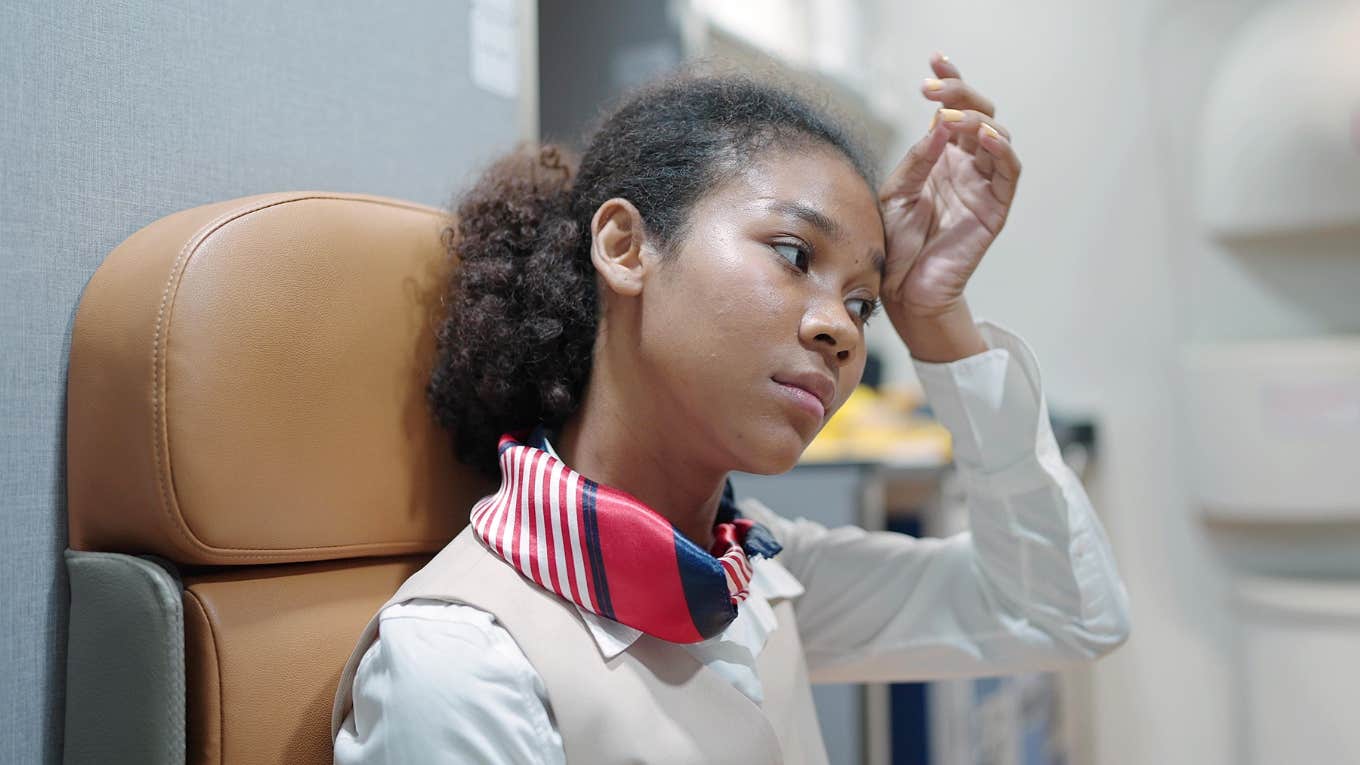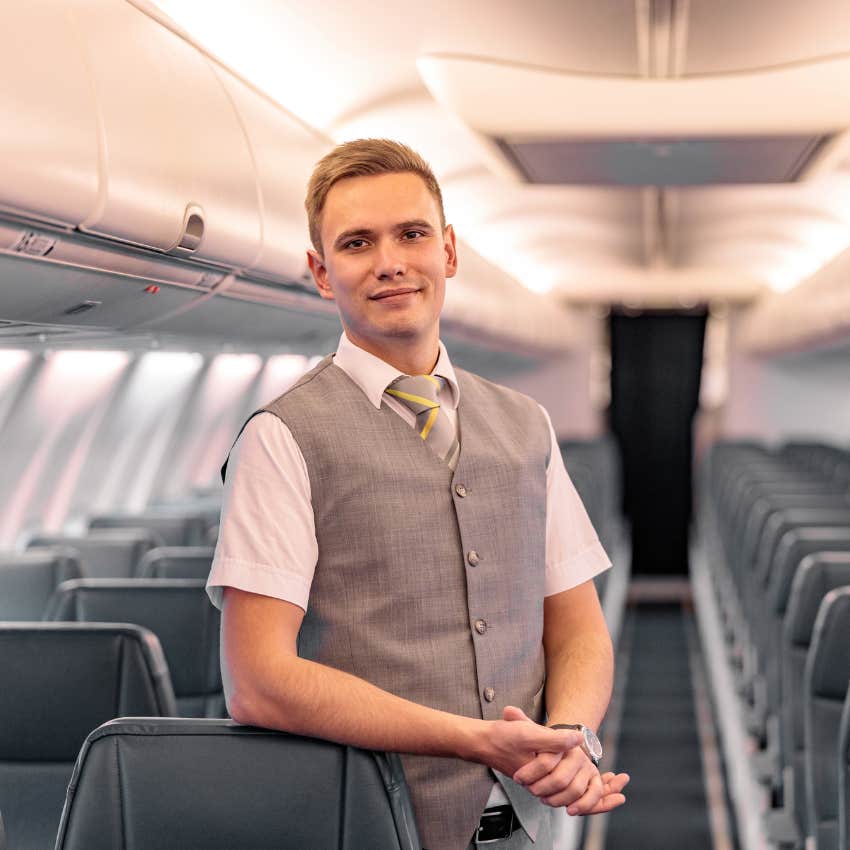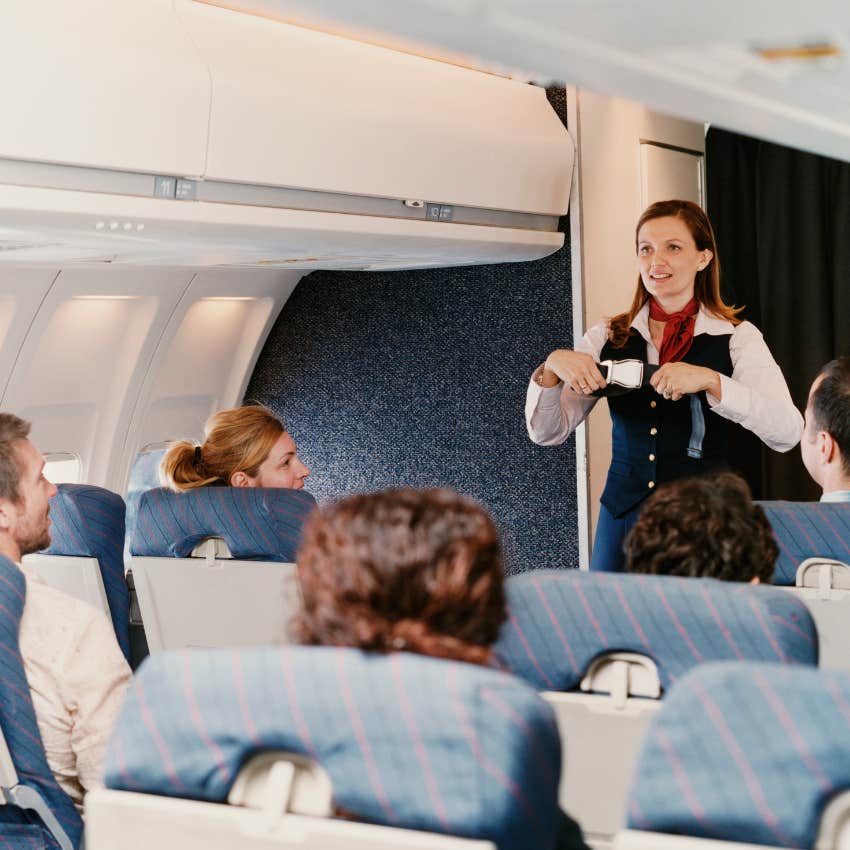‘Act Your Wage’ — Flight Attendants Don’t Get Paid To Argue With Passengers Over Rules, Says Union Memo
They shouldn't have to be arguing with people in the first place.
 M Stocker | Shutterstock
M Stocker | Shutterstock Knock-down, drag-out arguments between flight attendants and rowdy passengers have been increasing steadily for years, and since everyone seems to have lost their minds since the pandemic they have become almost a default part of air travel these days.
And one airline's flight attendants are simply having no more of it. In a leaked memo, their union told them flatly that until the airlines start paying better, fighting with passengers is off-limits. In short, they gave the staff one piece of advice: "Act your wage."
A union told flight attendants they don't get paid enough to argue with passengers.
If you're an anxious person like me, every annoyed sigh or terse word spoken on a plane sends you into low-grade hysterics. Will THIS finally be the flight you get ejected from because some animal can't follow very simple rules and instructions? Will THIS be the next flight that goes viral?
 Friends Stock | Shutterstock
Friends Stock | Shutterstock
Not if the union representing the flight attendants of Endeavor Air has anything to say about it. The company, a subsidiary of Delta that supplies flight attendants for Delta's regional flights, and its union, the Association of Flight Attendants (AFA-CWA), recently told staff to stop arguing with passengers, even if it's over a safety issue.
“The primary focus on all of the rules and regulations that we ask passengers to follow is to inform, not enforce," the union's memo reportedly said, according to travel industry news site PYOK. "We do not get paid to argue. Just stop. There’s absolutely no need to be extra,” the memo went on to say.
Some feel it's a safety issue. But it is likely related to upcoming union negotiations and unfair work practices.
On one hand, this all makes sense. There is absolutely no reason why flight attendants should have to deal with unruly passengers ever, for any reason. Except for the fact that sometimes, the issue at hand is a safety issue. Even then, Endeavor's staff are being told to stand down.
Instead, they are being held to an "inform, not enforce" policy, in which the flight attendant is supposed to remind the passenger of whatever rule they're breaking, and if they continue to not comply, they are to inform the captain if they're in the air or a gate agent if they're on the ground. Gate agents are empowered to call security or airport police if necessary.
 Digital Vision | Photo Images | Canva Pro
Digital Vision | Photo Images | Canva Pro
"[Arguing] is not within your job scope," the memo stated. "Act your wage. You’re a Flight Attendant, not a Red Coat." Why the terse language? Well, PYOK's Mateusz Maszczynski attributed it to forthcoming union negotiations between the union and Delta.
Although Endeavor is owned by Delta and its flight attendants work Delta flights, they are treated completely differently from Delta staff, especially where pay is concerned. They make between $10 and $40 less per hour than flight attendants employed directly by Delta, who are not unionized.
The Union's contract is up for renegotiation in 2027, and talks are expected to be contentious. Maszczynski theorized that the union is trying to ensure its flight attendants are not involved in any incidents in the lead-up to those negotiations.
'Inform, not enforce' has become standard in much of the industry and has shown results.
Though it may seem counterintuitive where safety is concerned, "inform, not enforce" has been in place in the airline industry for some time now, pioneered by United after its now infamous 2017 incident in which Dr. David Dao was bloodied while being physically dragged off a United flight to make room for airline staff "deadheading" to their next location.
The media mess that ensued made United change its policies to the "inform, not enforce" method, and its first big test came with the pandemic, when other airlines were beleaguered with incidents of angry passengers refusing to comply with onboard mask mandates.
United's approach was to simply let airport staff and law enforcement handle the incidents, and its number of mask-related uproars remained remarkably lower than its competitors during those dark days.
In fact, in 2021, United CEO Scott Kirby told PBS that its rowdy passenger incidents had actually declined lower than pre-pandemic levels. It seems that, regardless of the potential ethics involved, siccing police on unruly in-flight weirdos actually works.
John Sundholm is a writer, editor, and video personality with 20 years of experience in media and entertainment. He covers culture, mental health, and human interest topics.

